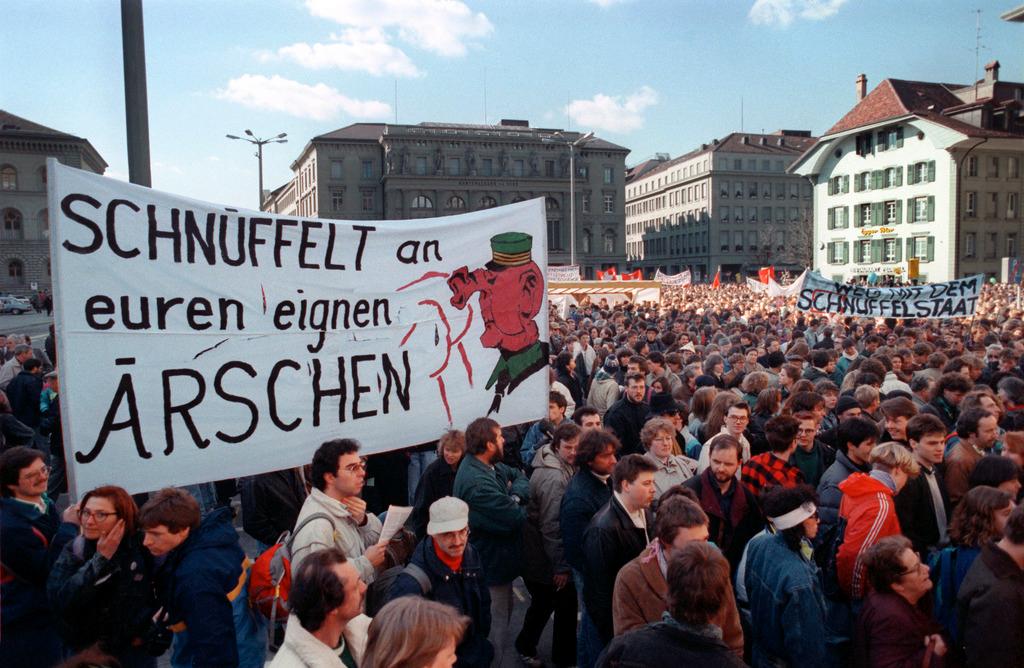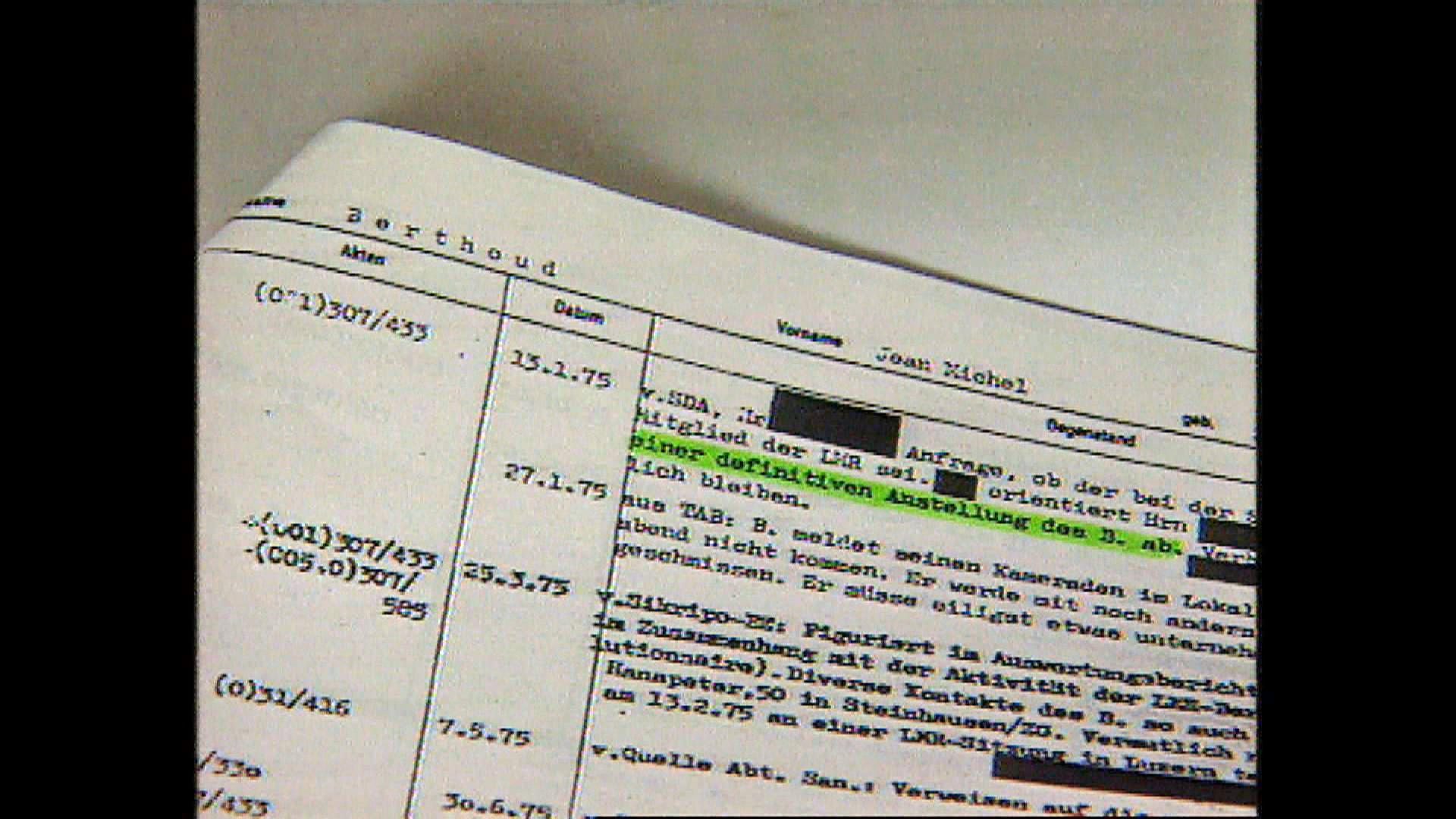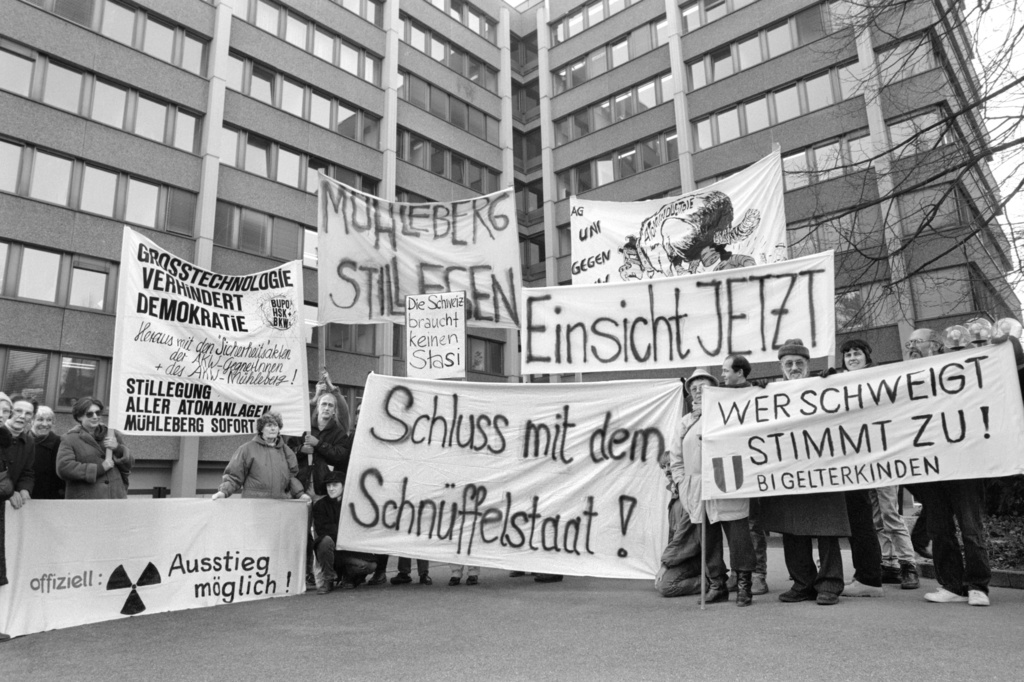Secret files scandal again looms large

In the post-Snowden era public outrage over state snooping remains muted. But 25 years ago things were very different in Switzerland. Angry citizens took to the streets in protest against the “secret files scandal”External link that shook the nation.
“The Swiss ‘Stasi’ observed me for 14 years. When I read my file I don’t know whether to laugh or cry – it’s incredible.”
Swiss journalist Jean-Michel Berthoud still keeps a copy of the secret state dossier on him from 1973-1987.
He was one of 900,000 individuals and organisations placed under surveillance by the federal police during the Cold War for suspect ‘un-Swiss’ behaviour.
At the time Berthoud was doing an internship at the Swiss News Agency, but unbeknownst to him the director and several colleagues were passing on information about reporters they deemed suspect to the authorities.
Berthoud was, at that time, a Trotskyist and a member of the Swiss revolutionary Marxist league. He lost his job at the news agency as a result of the reports, but has since gone on to become a successful journalist working for numerous media, including swissinfo.ch.
“At that time if you were on the left it was not a big surprise to discover a file on you,” said Berthoud.
What shocked him most, however, was that fellow citizens, even his neighbours, were reporting things to the police.
“I was sub-letting from architects and we talked openly about things and they told the police everything about me,” he said.

More
Snooping scandal leads to police shake-up
What became known as the ‘secret files scandal’ came to light in 1989 following the resignation of Justice Minister Elisabeth Kopp. After she admitted warning her husband of a criminal investigation into a company where he was vice-chairman, parliament ordered a special investigation into the ministry and the intelligence services.
Two weeks after the fall of the Berlin Wall, on November 24, 1989 a parliamentary commission presented their 243-page report. External link
What they had discovered was an Orwellian monster. Since the turn of the century, 900,000 files – for one out of every 20 Swiss citizens and one in three foreigners – had been created by cantonal and federal police forces. The information was neatly stored in archive cabinets at the Federal Prosecutor’s Office in Bern.
The files initially focused on German Nazis and leftwing activists during the Cold War period, but later included union members, feminists, Jura separatists, foreigners, “untrustworthy and suspicious” federal officials, and even Red Cross orphans.
The scale was immense. While some may have represented threats to the state, the general public was shocked to discover many banal innocent reports. Anyone considered unconventional or “un-Swiss” risked being recorded, whether by taking part in anti-nuclear demos, visiting communes, travelling to eastern Europe, belonging to certain groups and associations or buying certain books.
Berthoud said he was surprised to discover his mother had also been monitored, despite having no history as an activist.
“She had a butcher friend who was rightwing and he probably told the police she once went on an anti-Pinochet demo,” he commented.
Take to the streets
In March 1990, 35,000 people took part in a demonstration in Bern, calling for the abolition of the secret police, the release of the documents into public hands and the setting up of a second parliamentary commission. In all, 300,000 people requested to see their files.
The second commission confirmed the existence of a set of secret illegal files, as well as the existence of P-26, a secret stay-behind army, and a secret intelligence agency called P-27.
The growing scandal led to the reorganisation of the justice ministry. But in the eyes of critics these reforms were not enough. An initiative “SOS – for a Switzerland without a snooping police” was launched in 1990 but was rejected in a national vote in 1998 by three-quarters of the population.
In the mid-1990s the secret files were transferred to the federal archives and a new computerised system ISIS was introduced, subject to strict parliamentary controls.
But in 2010 the scandal again blew up when a parliamentary watchdog accused the secret services of collecting information on 200,000 suspects considered a threat to the state, mainly foreigners, in violation of the law. The public outcry that time was much more subdued, however.
“Quality over quantity”
In a recent interview in the NZZ newspaper, Markus Seiler, the current head of the Intelligence ServiceExternal link, confirmed that the ISIS database now contains files on 60,000 people.
He said the intelligence services now focus on “quality over quantity” and are subject to some of the toughest checks and balances in the world including oversight by the defence ministry, various parliamentary commissions and the data protection office.
Data Protection Commissioner Hanspeter ThürExternal link, who was spied upon suspected of being the founder of a Green party, agreed Switzerland had significantly reduced its intelligence-gathering capabilities since 1989 to concentrate on important cases.
Mass surveillance of Swiss citizens via the internet or telephone, similar to what the NSA and GCHQ are reportedly doing, is ‘inconceivable’, he said.
But he warned that ironically citizens were unwittingly assisting the intelligence services by not being careful with their own private data.
“People put everything on Facebook and social networks saying publicly what they ‘like’. State security is very interested in this kind of information which they can analyse,” he declared.
Changing times
Twenty-five years on the times have certainly changed, said Berthoud.
“It’s a completely different situation as we had a Cold War and everyone on the left was a state enemy. Now the intelligence services need to be able to fight terrorists but it’s very dangerous if the state takes away too many rights to inform itself.”
Traumatised by the files scandal, politicians have repeatedly refused efforts to give the secret services new investigative powers. But this could change as Switzerland stands poised to make amendments to its intelligence legislation.
Concerned by jihadist terrorists, next spring parliamentarians are due to discuss reforms including preventive intelligence-gathering measures such as phone-tapping, and the use of drones and malware.
Proper control mechanisms have again become a red-hot issue, said Thür.
“This reform of the intelligence services law is a major, dangerous expansion in technical possibilities. We need to make sure that very good checks are built into the system so abuses don’t occur. Some controls have been improved but others are needed,” he added.
Defending the files
The 1989 parliamentary commission report criticised the federal police for failing to give proper instructions and guidelines to officials or to carry out proper supervision. It claimed they had not adapted their activities to the changing threats, nor cooperated with other federal departments and had focused too much on left-wing extremists. The report also talked about “trivial facts” and “mere speculations without checking their validity”.
In a recent interview with the Swiss News Agency, the former head of the federal police, Peter Huber, maintained that charges against him and his staff are partly unjustified. He said the files were an ‘internal working tool’ and were subject to oversight, which was not sufficiently taken into account. While some reports contained ‘suspicious facts’, neutral and exonerating aspects were also recorded.
“I found the report as being partly prejudiced and biased,” he declared. “It was particularly painful for my colleagues and I to read one-sided critical reports in the press, which described us as almost Stasi-like. One statement by president Moritz Leuenberger who said the real enemies of the state were sitting in the federal prosecutor’s office went beyond the realms of unfair.”

In compliance with the JTI standards
More: SWI swissinfo.ch certified by the Journalism Trust Initiative













You can find an overview of ongoing debates with our journalists here . Please join us!
If you want to start a conversation about a topic raised in this article or want to report factual errors, email us at english@swissinfo.ch.